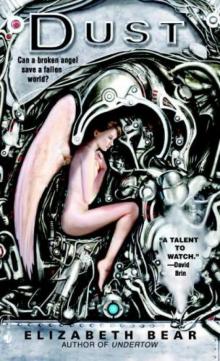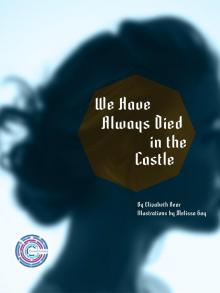- Home
- Elizabeth Bear
The Red-Stained Wings--The Lotus Kingdoms, Book Two
The Red-Stained Wings--The Lotus Kingdoms, Book Two Read online
Begin Reading
Table of Contents
About the Author
Copyright Page
Thank you for buying this
Tom Doherty Associates ebook.
To receive special offers, bonus content,
and info on new releases and other great reads,
sign up for our newsletters.
Or visit us online at
us.macmillan.com/newslettersignup
For email updates on the author, click here.
The author and publisher have provided this e-book to you without Digital Rights Management software (DRM) applied so that you can enjoy reading it on your personal devices. This e-book is for your personal use only. You may not print or post this e-book, or make this e-book publicly available in any way. You may not copy, reproduce, or upload this e-book, other than to read it on one of your personal devices.
Copyright infringement is against the law. If you believe the copy of this e-book you are reading infringes on the author’s copyright, please notify the publisher at: us.macmillanusa.com/piracy.
To Beth
The uninked pen
Drips
With possibility.
—The poetess Ümmühan
1
Over the gold stone walls of Sarathai-tia, the long night darkened toward sunrise. The Veil rose across the sky and the light of the heavenly river dimmed. Phosphorescence crawled along the top of the battlements, where the Dead Man was careful not to lean.
That glow revealed the presence of shards of dragonglass embedded edgewise in the mortar: quick as razors, and slow poison to whatever they might slice.
The Dead Man rested a hand on the butt of one of his twin pistols, instead. If the gesture was a threat, the threat was not one he consciously intended. He gazed outward, across the plain and the river that ran silt-white between its banks beyond. He had lowered his veil, and breathed the rainy air unfiltered.
That was a threat, or a statement, and it was an intentional one.
The Dead Man was waiting for the war to come.
He looked out over a city designed to be defended, which was a small but solid blessing. The Alchemical Emperor, in his day, had raised his throne city above the rich mud of the broad and flooding river valley by summoning the small mountain it stood upon from the very bones of the earth. Sarathai-tia’s outer walls were living rock, the same living rock as the steep terraced slopes that rose within them. A single road spiraled from the base of the city to the palace at its peak, joined to itself at intervals by alleys lined with overhanging shops and houses. The alleys would be easy to block with rubble, forcing an invading force to fight uphill the entire length.
The city was surrounded by the mighty river on three sides, and connected to the mainland only by a broad causeway that would normally be flooded in the rainy season, and all of which was in range of the city’s cannon. The villages that surrounded Sarathai-tia were built on stilts or floated on houseboats, and the farms grew rich between them when the annual floods receded.
Sarathai-tia’s outer wall was pierced by only two gates: the main gate that faced the causeway, away from the river … and the Queen’s Gate, the water gate, reached by a stair that ran down from the palace to the Mother River, surrounded by hanging gardens and suspended on pillars. The back side of the mountain was even steeper than the fore, and it would be quick work indeed to knock the stair off its pillars and use the resulting rubble to fill up more alleys and build barricades.
Sad, to destroy an architectural marvel, but sadder things happened in wars.
From his perch on the heights, the Dead Man could see a long way indeed across the flat, white river and the endless bottomlands it meandered through. He could see the villages and the piers lining the Mother River—called Relentless, called Deep-Hearted, called Butter of the Earth—on both sides. He could see the long, rich fields and the river so wide and slow and clotted with rafts of roots and lotus that it had become a slowly moving garden as the summer wore on.
The vanguard of the enemy reached the river’s far shore as those of Mrithuri’s people who had not yet evacuated to the fortress city were still setting flame to huts and bridges and whatever boats they could get to, under a hail of enemy arrows. They were leaving as little behind for the enemy’s forces to use as they could.
“Burn them,” the Dead Man had said. So now, as was his duty, he stood and watched as the livelihood of Mrithuri’s people floated away on the breast of the wide white Sarathai, blazing atop the reflections of their own flames. If his cheeks were damp, and it was not with sweat, there was no one present now to question him.
Until there was.
A step scraped the stones behind him. He was not startled; the battlements were well-manned and he had not thought himself entirely alone. He fastened the end of his veil across his face with a practiced gesture before he turned. His right hand did not leave the gun until he saw who came toward him.
A woman, the skin of her muscled arms silk-dark against the white of her sleeveless tunic, hurrying. Her tight, steel-colored curls gave a lie to her unlined face, and bangles on her wrists chimed merrily although her expression was stern. The Aezin Wizard, Ata Akhimah.
She paused to stare over the Dead Man’s shoulder—suddenly, as if distracted from whatever it was that she had come so urgently to say. She shook her head. “Who wages war in the rainy season?”
“It does seem an unfathomable choice.”
“Maybe cholera will thin their ranks for us.” She sounded as if the prospect pleased her.
The Dead Man couldn’t fault the sentiment. He cleared his throat. “Were you seeking me?”
The Wizard gestured toward the distance. “Was that what you were looking at?”
He knew without turning what she meant, but he turned anyway rather than stand with his back to it. The gates in the city’s outer walls, a catapult’s throw and a bit more away from the walls of the palace, still stood open. Farmers and fishers and tradespeople from the surrounding countryside poured into Sarathai-tia—those who had not chosen to take to their boats, or take their chances on the open road rather than in the squalor and starvation of a besieged city.
Beyond the bustle of boats and wagons, beyond the rivers of humanity and the river of pale water, beyond the flames consuming one stilt-legged hut after another, beyond the first jeering vanguards of the enemy—the main bulk of the advancing army had not yet come into view over the horizon. What was plainly visible was a long, black smudge against the sky, in the wrong direction to be the edge of the Veil sliding across the brilliant night.
It looked like smoke, but smoke never moved with such volition. Such sinister coordination: the flocking of many minds into a single consensus. Tendrils sought out from the dark mass, seethed and lifted, collapsed back. The body roiled and dappled, showing glimpses of sky beyond.
Carrion birds tracked the advancing forces, heralding the army as thunder heralds the storm.
At that moment, a shrill sound rent the air. A woman’s scream, meant to carry. Not in the city, or beyond the walls, as might be expected—but in the extensive, rain-soaked palace garden below and behind Ata Akhimah.
The Dead Man eyeballed the Wizard.
The Wizard sighed. “I guess we had better go see what’s fucked up this time.”
* * *
They ran. Side by side, wet soles slapping. Other defenders of the palace might be closer, it was true. But other defenders of the palace might not be as equipped to deal with the sorts of oddities that seemed to be making a more and more frequent appearance at Mrithuri Rajni’s court in these st
range days.
There came no second cry.
Their pelting steps carried them into the garden grounds, out of breath and slipping in the mud. The Dead Man’s veil sucked annoyingly against his mouth with each gasp for breath, the fabric slack and moist in the humid atmosphere. As he had expected, they were not the only searchers in the garden. Men and women carrying torches and lanterns fanned out along the gravel trails. Ata Akhimah glanced about at the bobbing pools of light, sighed, and outstretched one hand, pale palm upright.
A column of yellow-white light flared upward, hissing and shedding sparks, too bright to look at directly. It rose to the treetops and flowered, spreading brilliant chrysanthemum petals in every direction. It wasn’t a witchlamp such as the Dead Man had seen Rasan Wizards hang, but more like a captive lightning bolt, and it sounded angry as a trapped cat.
Conveniently, at that moment, the cry came again.
This time, the Dead Man recognized the voice. “Chaeri,” he said tiredly, and turned toward the sound.
Ata Akhimah was a step ahead of him. She darted into the strange, stippled shadows that fell hard-edged and jet-black where flowering branches, not yet fully leafed, broke the actinic light of her pillar. The Dead Man followed her, pistol in his hand.
They came to the garden wall and followed it along—just a few steps, into an open patch among flowering shrubs. Akhimah stepped to the side so that the Dead Man could come up with her—or possibly to clear his line of sight, and field of fire if necessary.
Chaeri, the queen’s handmaiden, stood with her back to them. Her dark hair spiraled down her back in artfully casual locks. She wore a tunic and trousers that were wet with rainwater, and mud spattered her bare ankles among the jingling bracelets.
She faced down two men—a large and muscular one, mustached, sword-wearing, in what the Dead Man took to be some kind of local uniform, and a small and round one in the seamed and petal-skirted black coat of a Rasan Wizard. They seemed quite familiar. The Dead Man’s chest itched as he realized that he had seen them only a few hours before. They had accompanied the assassin disguised as the poetess Ümmühan when she—he?—attempted to murder the young queen, Mrithuri.
The Dead Man had taken a pistol ball to the chest that had been intended for Mrithuri, and only the twinned lucks that that ball had first passed through her general, and that a Godmade priest had been near enough to work a miracle, had saved him.
These men he now looked at—or their likenesses—had vanished away when the assassin they accompanied was killed.
Studying them more closely, the Dead Man could see that the likenesses were not perfect. This captain and Wizard were considerably more haggard-looking and road-stained than the previous set. And the Wizard held a child-sized bundle of cloth to his chest, with light showing in the creases as if he shrouded a heatless, living coal.
Chaeri was drawing in her breath for one more good scream when the man with the mustache said, “Call her off. We surrender.”
His Sarathai was accented, but comprehensible.
“They’re spies!” Chaeri said. “Assassins!” She ducked back between Akhimah and the Dead Man. “I caught them coming over the wall again! Shoot them!”
“What’s in the bundle?” Akhimah asked. It made the Dead Man feel kindly toward her, as he too was inclined to investigate the mysteries of the situation rather than acting precipitately.
“They came over the wall,” Chaeri interjected. “If you let them talk, they’ll Wizard you into believing their lies, like that other one.”
“I believe I can withstand their blandishments,” Akhimah said kindly. The light of her spitting tower of cold fire limned the strong bones of her face. “A persuasive tongue is one of the gifts of my order, rather than that of Dr.—”
“Tsering,” the Rasan Wizard said. He stepped forward, still clutching his bundle. The Dead Man thought it moved.
The Rasan cleared his throat. “Tsering-la. This is Captain Vidhya. We are emissaries from Sayeh Rajni.”
“Where’s the poetess?” the Dead Man said.
Vidhya rocked back. “How do you know—?”
“One question at a time,” Ata Akhimah said gently. And, indeed, everyone fell silent, including the slowly growing crowd of garden searchers. She nodded to Tsering-la, who fumbled with the luminescent cloth-wrapped object tucked under his arm. He pulled back a fold, and a bedraggled crimson-and-gold head emerged, hesitantly. A broken crest of feathers fluffed.
“Pretty bird?” the phoenix said faintly.
“Guang Bao,” Tsering-la said. “He is Sayeh Rajni’s familiar. She sent him with us to prove we were her men.” He smiled. “Now it’s your turn.”
“Someone sent an apparition of the two of you, along with an assassin disguised by illusion to look like the poetess, to murder Her Abundance Mrithuri Rajni,” Akhimah said.
A guard cleared his throat, or maybe it was one of the acrobats who were sheltering in the palace.
“Speak,” Ata Akhimah said.
“Are these who they seem to be?” It was an acrobat, the Dead Man noticed. Amruth, the matriarch Ritu’s son.
“I only engage in royal prophecy,” Akhimah replied dryly.
“No Ümmühan this time,” the Dead Man noted.
Ata Akhimah reached into her pocket and produced a silver clip that seemed empty in the difficult light. She held it up, and the Dead Man surmised it must contain the single strand of silver hair that had been sewn into her jacket by unknown hands. “No, she must be captive. That’s why she was the focus of the illusion.”
“Yes,” Vidhya said. “The poetess, our rajni, her heir, and Tsering’s apprentice Nazia are all captive of Himadra.” He turned his head and spat into wet moss. “Our kingdom lies in ruins—if there are even ruins there. We came to beg you for aid. Instead, we come flying before an army.”
“A great volcano beneath the Bitter Sea has shaken the city down,” Tsering-la said. “And then boiled it in a cloud of steam and poison.”
The Dead Man spoke to Chaeri over his shoulder, in the politest tone he could muster. “Just out of curiosity, what were you doing in the bushes?”
“Feeding the songbirds,” she said primly, as if recollecting herself. Perhaps his tone had not been polite enough. He heard her dusting off her hands.
There were, indeed, rather a lot of seeds scattered on the earth nearby, and trampled into the mud. No birds were in evidence, but then there was a lot of fuss going on.
“Is that Himadra’s army in pursuit of you?” the Dead Man asked, returning his attention to Vidhya.
Sayeh’s guard captain glanced up at him from beneath furrowed brows. “You mean you don’t know already?”
“Only there are a number of armies wandering about the countryside lately, and this one rather came out of nowhere,” the Dead Man snapped.
“Yes they did.” Vidhya leaned against the stone wall as if nothing else kept him upright. “They’ve got an illusionist, I think.”
“Yes,” Akhimah said. “We found out.”
“Anuraja. It’s Anuraja’s men.”
“From the north?” said Akhimah.
The round little Rasan Wizard in his torn once-black coat shrugged hard enough to split the shoulder seam further. The phoenix made an indignant mumble.
Ata Akhimah sighed tiredly. “I think we’d better go inside and have a word with Her Abundance.”
Tsering-la’s answering sigh was one of relief. “Thank you.”
Ata Akhimah slapped dust off her sleeve and let the tower of light die. “Don’t thank me. You’ve arrived in a city that is about to be under siege. We can use all the Wizards we can get.”
* * *
Clarity burned through the young rajni’s veins with the lucid potency of venom. It made her restless. It made her ruthless. It made her fierce.
She sat among cushions and regarded her advisors, chafing her arms with her palms. Trying to drive the prickling heat through them. Syama, her bear-dog, lay against her
hip—eyes sleepy, but brindled body quivering with the tension Mrithuri was communicating.
At least the venom gave Mrithuri concentration. Everything else was terrible.
She could not recall the last time she had really slept. She could not even imagine, any longer, what being rested might feel like except in absences. She vaguely remembered joints and eyes and thoughts that did not grit sluggishly and ache inside her.
The venom helped with that, too. Much more than the tea she now lifted from a low traylike table set among the rugs and cushions, all the while wishing very much that it were wine. Before her were arrayed most of her nearest and most trusted: sharp little Hnarisha with his delicate bones and rounded features; Yavashuri, the maid of the bedchamber who knew (probably literally) where the bodies were buried; Druja, the agent who traveled to foreign lands; her general, Pranaj; and her newly acquired dependent, the unexpectedly clever and wicked Lady Golbahar.
Oh, and that asshole Mi Ren, the Song princeling who thought Mrithuri ought to marry him, and who nobody could quite figure out how to get rid of without offending his powerful family, from whom he had requested troops and money on behalf of the rajni he supposed must inevitably become his ticket to true regal power.
Missing only were her body servant Chaeri, whom she had not seen since before this meeting when Chaeri brought her her Eremite serpents; her Wizard, Ata Akhimah; and the Dead Man, sent to her rescue by the foreign Wizard who had trained Ata Akhimah.
All of them—the ones who were present—were very upset about a siege that could not succeed. Mrithuri had explained that it could not succeed, because Sarathai-tia was raised above a floodplain, and the Mother River would inevitably rise and sweep any besiegers away. Her illustrious ancestor, the Alchemical Emperor, had designed his capital city that way.
Mrithuri’s people did not dare raise their voices to her. But that did not in the least stop them from raising their voices at one another, despite mostly being in agreement. The exception was Mi Ren. The foreign half-prince, or near-prince, or whatever he was—Mrithuri could never keep the endless and varied intricacies of ranks in the endless and varied Song principalities organized in her head, which was one of the many reasons she had Hnarisha—was cheerfully yelling at everyone, despite apparently having no idea what was going on and no idea that he had no idea. One of Mi Ren’s lackeys stood beside him, looking impassively embarrassed and holding his coat.

 Scardown
Scardown Worldwired
Worldwired Ancestral Night
Ancestral Night Hammered
Hammered The Red Mother
The Red Mother The Red-Stained Wings--The Lotus Kingdoms, Book Two
The Red-Stained Wings--The Lotus Kingdoms, Book Two Machine
Machine Some of the Best from Tor.com: 2019 Edition
Some of the Best from Tor.com: 2019 Edition Faster Gun
Faster Gun In the House of Aryaman, a Lonely Signal Burns
In the House of Aryaman, a Lonely Signal Burns Stone Mad
Stone Mad Robots: The Recent A.I.
Robots: The Recent A.I. The Tempering of Men
The Tempering of Men Boojum
Boojum Book of Iron bajc-2
Book of Iron bajc-2 The Year's Best Dark Fantasy and Horror, 2010
The Year's Best Dark Fantasy and Horror, 2010 New Cthulhu 2: More Recent Weird
New Cthulhu 2: More Recent Weird Dust jl-1
Dust jl-1 Worldwired jc-3
Worldwired jc-3 An Apprentice to Elves
An Apprentice to Elves Hammered jc-1
Hammered jc-1 Crowd Futures: We Have Always Died in the Castle
Crowd Futures: We Have Always Died in the Castle Bone and Jewel Creatures bajc-1
Bone and Jewel Creatures bajc-1 Carnival
Carnival Some of the Best from Tor.com: 2012 Edition: A Tor.Com Original
Some of the Best from Tor.com: 2012 Edition: A Tor.Com Original The Stone in the Skull
The Stone in the Skull Scardown jc-2
Scardown jc-2 Hell and Earth pa-4
Hell and Earth pa-4 Undertow
Undertow Mermaids and Other Mysteries of the Deep
Mermaids and Other Mysteries of the Deep A Companion to Wolves
A Companion to Wolves Ink and Steel pa-3
Ink and Steel pa-3